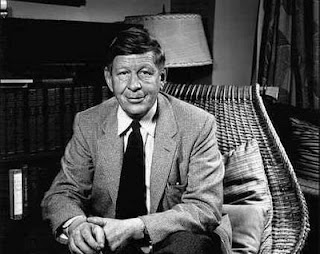The Cull by Julith Jedamus
Last night I heard gunshots in Richmond Park,
but my November mind, thick with smoke
and fear of wars
and phantom men, mistook the reason:
the cull of bucks and stags after the rutting season,
when mast is scarce.
At dawn I walked through Bog Gate, and found
nothing: no drag mark, no blood on the ground,
no trace of violence.
Mist threaded red bracken, and the broken ridge
of pollard oaks that march towards Holly Lodge
and its sharp defence.
By the track they call Deane’s Lane I saw him:
a twelve-point stag, his scraped horns trimmed
with moss and bracken,
his hindquarters lean, one shin gored and clotted.
I watched him browse for chestnuts, and waited for a quickening,
an unseen sign—his, the day’s, mine.
from New Poetries V © Julith Jedamus
This poem seems to me to revolve around the speaker 'jumping to conclusions': she is surprised twice (at least) by the actuality of the situation, which in her imagination has become much more dramatic and devastating. Firstly at the beginning, there is the confusion about the sound of bullets being fired; secondly at the end, there is the breath-held surprise that the wild stag doesn't bolt when the poet comes across him. But there is also within the poem the description of red bracken (as if blood-drenched), the polled oaks (as if wounded or amputated) and the 'sharp defence' of Holly Lodge (as if the forest house had too played a part in some kind of battle). Almost subconsciously, the speaker cannot avoid continuing to 'mistake the reason', describing everything she sees in terms of 'wars and phantom men'. Yet it is of course this double – or perhaps it could be called 'reversed' – metaphor, which indicates Julith Jedamus's skill as a poet. By owning up at the outset to reading too much into the sound of guns, she frees herself of the burden of making too heavy a point, while instantly making it all the same. This ability to make it feel as though it is us the reader, not her the speaker, who is making all the necessary associations, is an excellent example of Jedamus's admirable use of both technique and poetic imagery.
Reading this poem makes me wonder how many writers took up their pens on hearing the news, last autumn, that a fully paid-up stag-hunter had shot down 'Britain’s largest wild animal'? I certainly did, but repeatedly failed to find the right means to express its relevance at the time. In 'The Cull', Julith Jedamus deals with the topic of legal killings extremely well, and it is probably for this fine and elegant handling of her chosen subject matter that I most admire her as a poet.



